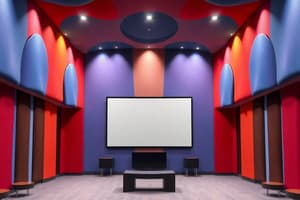Podcast
Questions and Answers
What is room acoustics?
What is room acoustics?
- The design of musical instruments
- The study of sound in open spaces
- The study and manipulation of sound within an enclosed space (correct)
- The practice of soundproofing
What is the importance of understanding room acoustics?
What is the importance of understanding room acoustics?
- Only for music production and broadcasting
- Not important at all
- Only for architecture and design
- Essential for various fields, including architecture, design, engineering, music production, and broadcasting (correct)
What is reverberation time?
What is reverberation time?
- The time it takes for sound energy to reach its maximum intensity
- The time it takes for sound energy to decay by 60 dB after the sound source stops (correct)
- The time it takes for sound energy to increase by 60 dB
- The time it takes for sound energy to reach its minimum intensity
What is the desired reverberation time for concert halls or recording studios?
What is the desired reverberation time for concert halls or recording studios?
What is the purpose of sound-absorbing materials or diffusers in room acoustics?
What is the purpose of sound-absorbing materials or diffusers in room acoustics?
What is the effect of echoes in a room?
What is the effect of echoes in a room?
What is included in the measurement and evaluation of a room's acoustic properties?
What is included in the measurement and evaluation of a room's acoustic properties?
What is the preferred reverberation time for spaces such as classrooms or conference rooms?
What is the preferred reverberation time for spaces such as classrooms or conference rooms?
What is the main purpose of a bass trap?
What is the main purpose of a bass trap?
Why should speakers be positioned away from walls?
Why should speakers be positioned away from walls?
What is the effect of a larger room on reverberation time?
What is the effect of a larger room on reverberation time?
What is the term for the persistence of sound in a space after the original sound source has ceased?
What is the term for the persistence of sound in a space after the original sound source has ceased?
What is the purpose of acoustic measurement tools?
What is the purpose of acoustic measurement tools?
What type of reflection is direct and coherent?
What type of reflection is direct and coherent?
What is the result of a surface scattering sound waves in multiple directions?
What is the result of a surface scattering sound waves in multiple directions?
What is the term for the conversion of sound energy into heat?
What is the term for the conversion of sound energy into heat?
Why is it recommended to experiment with different seating arrangements?
Why is it recommended to experiment with different seating arrangements?
What is the purpose of acoustic treatment in a room?
What is the purpose of acoustic treatment in a room?
What is sound diffusion?
What is sound diffusion?
What is the purpose of acoustic panels?
What is the purpose of acoustic panels?
What is sound transmission?
What is sound transmission?
What is the purpose of soundproofing techniques?
What is the purpose of soundproofing techniques?
What are room modes or resonances?
What are room modes or resonances?
What is the purpose of diffusers?
What is the purpose of diffusers?
What is the purpose of bass traps?
What is the purpose of bass traps?
What is reverberation?
What is reverberation?
What is the objective of acoustic treatment?
What is the objective of acoustic treatment?
Why is understanding room acoustics important?
Why is understanding room acoustics important?
What is the primary cause of reverberation in a room?
What is the primary cause of reverberation in a room?
What is the primary role of direct sound in sound localization?
What is the primary role of direct sound in sound localization?
What is the purpose of managing early reflections in room acoustics?
What is the purpose of managing early reflections in room acoustics?
What is the purpose of diffusing elements in room acoustics?
What is the purpose of diffusing elements in room acoustics?
What is the term for the rapid and repetitive series of reflections between two parallel surfaces?
What is the term for the rapid and repetitive series of reflections between two parallel surfaces?
What is the primary goal of controlling reverberation time in room acoustics?
What is the primary goal of controlling reverberation time in room acoustics?
What is the term for the measure of the ability of a diffusing surface to scatter sound waves?
What is the term for the measure of the ability of a diffusing surface to scatter sound waves?
What is the primary role of the signal-to-noise ratio in room acoustics?
What is the primary role of the signal-to-noise ratio in room acoustics?
Flashcards are hidden until you start studying
Study Notes
Room Acoustics
- Room acoustics is the study and manipulation of sound within an enclosed space, involving understanding how sound waves behave and interact with the surfaces, objects, and dimensions of a room.
Fundamentals of Room Acoustics
- Understanding room acoustics is essential for various fields, including architecture, design, engineering, music production, and broadcasting.
- Applying room acoustics principles can enhance sound quality, minimize unwanted noise and resonance, and create an immersive listening experience.
Measurement and Evaluation of Room Acoustics
- Measuring and evaluating a room's acoustic properties involves assessing parameters such as reverberation time, echo, sound diffusion, sound absorption, and sound transmission.
- Reverberation time is the time it takes for sound energy to decay by 60 dB after the sound source stops, determining the "liveliness" or "deadness" of a room.
Reverberation and Echo
- Longer reverberation time is desired for concert halls or recording studios to create a sense of ambiance and richness in sound.
- Shorter reverberation time is preferred for spaces like classrooms or conference rooms to improve speech intelligibility and clarity.
- Echoes are repetitions of sound caused by reflections from hard surfaces, creating a sense of muddiness or confusion, particularly when they overlap with the direct sound from the source.
Sound Diffusion and Absorption
- Sound diffusion refers to the distribution of sound energy in different directions, dispersing sound evenly throughout a room, reducing standing waves or resonances.
- Sound absorption is the process of converting sound energy into heat, using materials with high absorption coefficients, like acoustic panels or bass traps, to reduce reflected sound and control excessive reverberation.
Sound Transmission and Room Dimensions
- Sound transmission refers to the extent to which sound energy passes through walls, floors, and ceilings, and can be minimized using soundproofing techniques.
- Room dimensions and geometry play a crucial role in controlling room modes or resonances, which occur when sound waves bounce between parallel walls, causing certain frequencies to be emphasized or canceled out.
Acoustic Treatment and Optimization
- Acoustic treatment involves controlling sound energy within a space using various materials and techniques, such as absorbers, diffusers, and bass traps.
- Speaker and listener placement significantly affect sound quality, and should be optimized to minimize interaction with room boundaries and unwanted reflections.
Monitoring and Testing
- Monitoring and testing are essential to ensure the effectiveness of acoustic treatment and optimize sound quality, using tools such as sound level meters and spectrum analyzers.
- Objective feedback from measurements helps identify issues, allowing for targeted adjustments and improvements.
Key Terms and Concepts
- Reflection: when sound waves bounce off and change direction, either specular (direct and coherent) or diffuse (scattered).
- Absorption: the conversion of sound energy into heat, reducing reflection and transmission.
- Diffusion: the scattering of sound waves in multiple directions, creating a more even distribution of sound energy.
- Reverberation: the persistence of sound in a space after the original sound source has ceased, caused by multiple reflections.
- Standing Waves: resonant modes that occur when sound waves reflect back and forth between two parallel surfaces, reinforcing or canceling certain frequencies.
- Direct Sound: the sound that travels directly from the source to the listener without any reflections, playing a significant role in sound localization and clarity.
- Signal-to-Noise Ratio (SNR): the relative level of the desired sound signal to the background noise in a room.
- Early Reflections: the first reflections of sound that reach the listener shortly after the direct sound, providing information about the room's size, shape, and characteristics.
- Diffusion Coefficient: measures the effectiveness of a diffusing surface in scattering sound waves.
- Flutter Echo: a rapid and repetitive series of reflections between two parallel surfaces, creating a distinct and undesirable sound artifact.
Studying That Suits You
Use AI to generate personalized quizzes and flashcards to suit your learning preferences.




